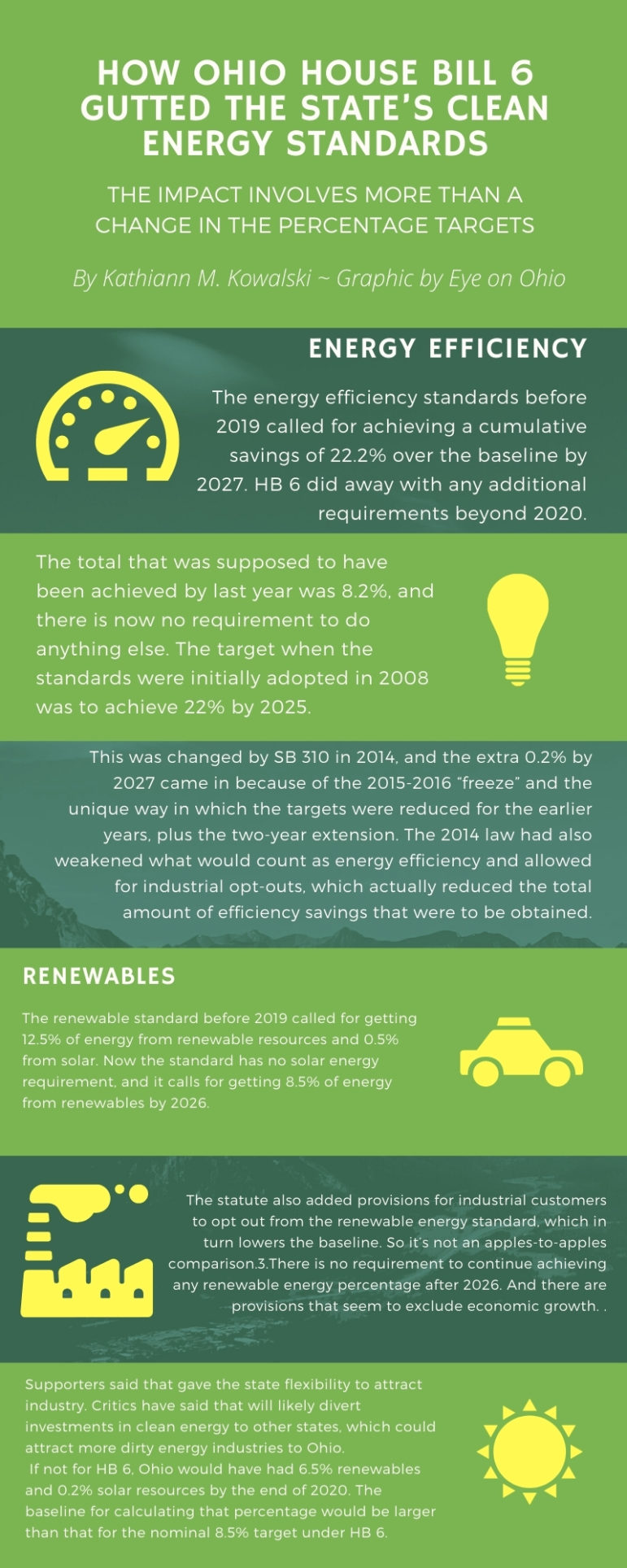House Majority Floor Leader Bill Seitz called the law at the heart of an alleged corruption case “the best energy bill we ever passed.”
This article provided by Eye on Ohio, the nonprofit, nonpartisan Ohio Center for Journalism in partnership with the nonprofit Energy News Network. Please join our free mailing list or the mailing list for the Energy New Network as this helps us provide more public service reporting.
Documents made available last week show how House Majority Floor Leader Bill Seitz, R-Cincinnati, championed gutting Ohio’s clean energy standards in the state’s 2019 coal and nuclear bailout law. He has since served as a force against repeal.
Claims in a federal complaint released in July indicate that the law was at the heart of an alleged corruption scheme involving roughly $60 million. Former Ohio House Speaker Larry Householder, R-Glenford, and others were arrested last summer.
Failure to repeal the law in 2020 was “an astounding failure by Republican leadership,” said Rep. David Leland, D-Columbus, as the legislature adjourned last month.
“Repealing the bill would be the dumbest thing ever done,” Seitz said in an Aug. 28 email to Ohio Energy Association lobbyist Michael Kurtz. “All we need to do is to strengthen the audit standards and possibly revisit the FE [FirstEnergy] decoupling provision. The herd of sheeple are all in a panic over what I consider the best energy bill we ever passed in my 20 years.”
The email and other documents are among materials newly available from the Ohio House in response to a federal subpoena issued this past summer.
Allegations in the federal criminal case indicate that FirstEnergy and FirstEnergy Solutions — now known as Energy Harbor — provided most of the funding for an alleged scheme to elect favorable lawmakers and then to pass and defend HB 6. The companies have said they are cooperating with ongoing federal investigations and are not named defendants in the criminal indictment, which refers to them as Company A and Company A-1.
“We need to be surgical here because a delayed repeal might end up being a complete repeal if we fail to act on a replacement. Worse still, the replacement could be worse than the repeal,” Seitz said in a text to people identified as “JB” and “Adam H” after the complaint became public. “Moreover, we need to recognize that any replacement bill will reopen the referendum for the folks who opposed HB 6 in its entirety,” Seitz added.
“What I mean was a bill that ultimately became HB 798,” Seitz said. That bill, reported out by a House select committee on Dec. 17, arguably could have ratified HB 6 without any meaningful chance for a citizen referendum.
The bill would have added a one-year delay for the collection of HB 6’s nuclear subsidies to benefit Energy Harbor. During that time, the Public Utilities Commission of Ohio would presumably conduct an audit of Energy Harbor. Other provisions of HB 6 would stay in place, including the gut of clean energy standards, subsidies for two 1950s-era coal plants, and provisions to make FirstEnergy and possibly other utilities “recession-proof.”
Rulings from the Ohio Supreme Court and the Franklin County Court of Common Pleas have temporarily postponed collection of the nuclear plant subsidies anyway. Meanwhile, FirstEnergy benefits from the 2019 law’s revenue guarantee provision. Consumers pay subsidies for the old coal plants. And provisions that gutted Ohio’s renewable energy and energy efficiency standards are in full force.

‘Do they need the money?’
Although the General Assembly did not pass HB 798, Seitz was working to make it even more favorable to Energy Harbor. The tweaks would have given Energy Harbor the option of taking the $150 million per year in subsidies from HB 6 or seeing if it could do better in the PJM market. A federal minimum offer price rule, or MOPR, calls for increasing the capacity market bids for power plants that get state subsidies. The rule was proposed and finalized before Energy Harbor emerged from the FirstEnergy Solutions bankruptcy case.
“I will continue to advocate for the same positions” during the new legislative session, particularly those from HB 798, Seitz said.
Asked why he would help Energy Harbor shape the law despite the corruption charges, Seitz said no corruption charges have been leveled against Energy Harbor or other members of the General Assembly except Householder. “In fact, Energy Harbor did not even exist during the time of the alleged corruption,” Seitz said, adding that “to repeal HB 6 would be to pull the rug out from them when they relied on a duly-enacted law.”
That’s misleading and “largely meaningless,” said former PUCO member Ashley Brown, who now heads the Harvard Electricity Policy Group. Energy Harbor is the successor in interest to FirstEnergy Solutions. Existing creditors or new investors knew the company had been in financial trouble, Brown noted. And Energy Harbor’s leadership includes multiple people who were in charge while it was known as FirstEnergy Solutions and when HB 6 was debated.
“And, in fact, FirstEnergy Solutions lobbyist Juan Cespedes has already pleaded guilty to one RICO charge for his involvement in the $61 million Ohio bribery scandal,” noted Miranda Leppla, vice president of energy policy for the Ohio Environmental Council Action Fund. RICO is the federal Racketeer Influenced and Corrupt Organizations Act.
Materials uncovered last year by policy and communications manager Dave Anderson at the Energy and Policy Institute show that Cespedes worked on behalf of FirstEnergy Solutions during the bankruptcy case. During that time FirstEnergy Solutions paid money to Generation Now. The dark money group is a defendant in the criminal case.
And while Seitz maintained that “no alleged corruption infected all of HB 6,” others such as Rep. Mike Skindell, D-Lakewood, have stressed that “all of it — not just part of it” is tainted by the alleged corruption.
“To suggest we can parse out which pieces of the bill were not the product of corruption is wishful thinking,” Leppla said. “There is an ongoing FBI investigation, with more shoes likely to drop, so we won’t know the full extent of the corruption for some time.
Although a FirstEnergy Solutions officer provided brief testimony on HB 6 in 2019, the company has not provided financial materials in any hearings to back up its alleged need for funding. Asked why he wouldn’t make Energy Harbor provide such sworn testimony now, Seitz said the proposed regulatory audit would be “much better than any testimony at this point.”
“Pushing it off to a closed-door audit that won’t be made fully public is a convenient way for legislators to avoid public scrutiny and outrage at forking over Ohioans’ hard-earned money to bail out a company that doesn’t need it,” Leppla said.
“I can’t think why the legislature would not want this information,” Brown said. Indeed, an option approach would tell Energy Harbor that it could draw on a slush fund if it is too incompetent or too inefficient to compete. In his view, the whole approach is “beyond crony capitalism.”
Favoring one technology
Seitz said subsidies for Energy Harbor’s nuclear plants would “preserve carbonless generation in Ohio … with respect to an asset that has many years left.”
If Seitz truly wanted to preserve carbonless generation in the state, Leppla said, “one would think he would be more interested in removing artificial barriers to other forms of carbon-free generation in the state of Ohio, but that has not been the case.”
Instead, Seitz’s position “favors a particular technology that doesn’t emit carbon. But in the process he is promoting some carbon resources” with subsidies for the 1950s-era coal plants, Brown said. “And he’s also doing away with support for a huge amount of carbonless generation that Ohio can avail itself of.”
“There’s probably no power plant in the country that’s not subsidized in one form or another,” Brown added in response to Seitz saying that wind and solar energy continue to get federal subsidies. Moreover, Brown said, the HB 6 subsidies would help Energy Harbor, but not other nuclear plants in the PJM region, thus further distorting the market.
Seitz also distinguished his opposition to the clean energy standards by saying that ratepayers save under HB 6 because they don’t pay for those programs. He previously cited a Legislative Service Commission memo, forecasting more than $2 billion in savings from not paying those costs through 2030.
However, the memo did not consider any benefits from the standards. A previous analysis by the Environmental Law & Policy Center and the Ohio Environmental Council found ratepayers had been getting average net savings of $3.61 per month. They also saved another $2 per month on wholesale energy prices. All told, the Ohio Environmental Council’s estimates show HB 6 will cost consumers an extra $7.01 per month once all subsidies kick in.
The materials produced last week also show Seitz taking credit for gutting the clean energy standards in HB 6.
“Just remember, we need to stop mandate mountain when you vote on HB 6!!!” Seitz texted a “Christina R.,” apparently in June 2019.
“I LOVE how you took out the renewable and EE [energy efficiency] mandates thereby reducing the monthly charges on the rate payers,” Christina R. wrote back. “I recalled our conversation at a reception across the street some weeks ago… and smiled.”
“It took me a long time to steer the Speaker in the right direction, but HB 6 is a pretty good product,” Seitz responded.
Two days after HB 6 passed, Seitz texted “Larry H.”, presumably Larry Householder, to say only one Republican from Southwestern Ohio voted against HB 6. “Tells me we understand the team concept better than a lot of others do,” Seitz wrote.
“Absolutely,” Householder responded. “BTW – I need to discuss a little program w you we will start next month. Are you in town anytime soon.” Attack ads and other steps to defeat the referendum effort on HB 6 began in August 2019.
“He never followed up with me that I can recall,” Seitz said.
“What we do know,” Leppla said, “is that HB 6 was a widely disliked bill that will raise Ohioans’ bills, pollute our air, and send us backward in the fight against climate change — and yet, it passed anyway,”

